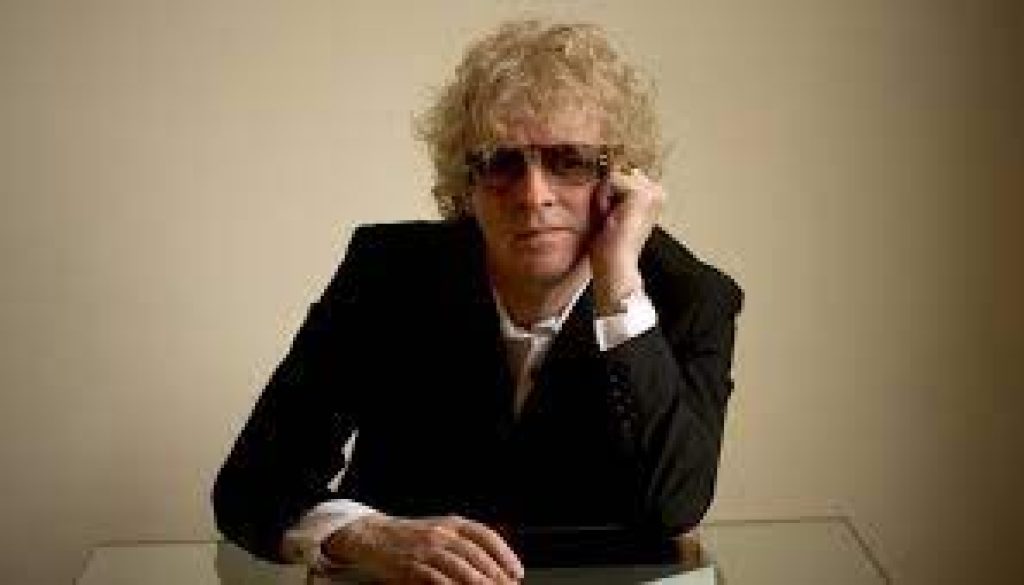Ian Hunter on Defiance Part 2 and the State Of Rock & Roll (Interview)
Ian Hunter, former Mott The Hoople front man, has just released a new album titled Defiance Part2: Fiction. It is a star-studded affair featuring members of Queen, Def Leppard, Cheap Trick, Stone Temple Pilots, Pearl Jam, The Black Crowes and friends like Johnny Depp, Lucinda Williams, Billy Bob Thornton and final contributions from Jeff Beck and Taylor Hawkins.
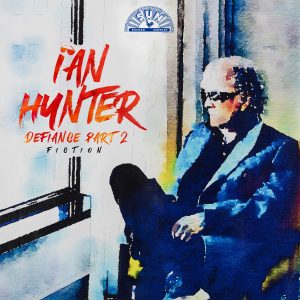 But the guests never overshadow Hunter’s songs, his passion or his own legacy, one that has been in the making for over 60 years. At age 84, Ian Hunter is still making music and still connecting to anyone who has a rock & roll heart. Listen in as super-fan Marty Duda manages to catch his breath and get Ian talking…not only about the new album, but career highlights such as meeting Bob Dylan, idolizing Jerry Lee Lewis (and Sonny Bono), working with Guy Stevens and David Bowie and finding out this his friend Mick Ronson may have sticky fingers.
But the guests never overshadow Hunter’s songs, his passion or his own legacy, one that has been in the making for over 60 years. At age 84, Ian Hunter is still making music and still connecting to anyone who has a rock & roll heart. Listen in as super-fan Marty Duda manages to catch his breath and get Ian talking…not only about the new album, but career highlights such as meeting Bob Dylan, idolizing Jerry Lee Lewis (and Sonny Bono), working with Guy Stevens and David Bowie and finding out this his friend Mick Ronson may have sticky fingers.
Click here to listen to the interview with Ian Hunter:
Or read a transcription of the interview here:
IH: One, two…
MD : Hello, Mr. Hunter.
IH: How are ya?
MD: I’m good. My name is Marty. I’m in Auckland, New Zealand this morning. Thank you for taking time to talk to me. Are you in Connecticut somewhere?
IH: Yeah. Boy, you’ve got some records! (Ian can see my record collection via Zoom)
MD: Oh good, you can see me. I was wondering if you could or not. Yeah, I got a few records. Quite a few of yours, by the way, I got the new one. There it is.
IH: Oh, great.
MD: Do you have a big record collection? Or is it modest?
IH: Nah, I’ve got a few, you know. Ronson nicked a lot of mine. Mick Ronson, expert record nicker!
MD: Who would have guessed? He seemed like such a nice guy.
IH: I know, that’s what I thought.
MD: Oh, well..Old Records…but there you go. So I obviously want to talk to you about the new album, because it’s just come out a couple days ago and I got the Record Store Day version with the extra tracks on it, so it’s all very good. But I noticed that you’ve been describing it as being kind of denser, that Part Two is being denser than Part One. And I was wondering, do you mean that musically, thematically….tell me if you can elaborate on that…the way you look at the record.
IH: It seemed that Part One was a little lighter. And it seems that Part Two is a little denser. I was trying to avoid the politics of the situation we find ourselves in, you know, but you know it sort of creeps up on you.
MD: Yeah, it’s hard to ignore.
IH: Yeah. So there’s a bit more like that, you know, but I try to keep it under control.
MD: I mean, you’ve lived in the States for like, 45 years, so you’ve probably got a pretty good understanding of how things are working over there as much as anyone does. But do you look out and go…does it seem different to you now this divisiveness that’s in the country?
IH: Yeah, it does. It does. And it’s sad….that everybody’s fallen for it. It’s money, And you know, hysterical press.
MD: Yeah. Speaking of money, it’s I was thinking about that…that there’s this emphasis on on money, there seems to be a devaluation of music. You know, with Spotify, people kind of think that it’s free these days. Do you see any kind of correlation between those things?
IH: Well, yeah, yeah. To cut the long story short, yeah.
MD: That does indeed cut it short, yes. So feel free to elaborate if you want.
IH: I don’t know. I mean, the whole thing now is apparently the attention spans have disappeared. This is what I’m told. And so therefore, you, you put your albums out in increments, and that’s why you get people moaning about the extra bonuses and five tracks are missing and all this kind of thing. Because my kind of people you know, they’re not used to that, they’re used to the album comes out. And that’s it. Now, it’s a protracted sort of, you know, single then video then second single then second video, the whole idea being to keep you in the public eye as long as possible. And that’s the new way of doing it.
MD: And motivation wise…I don’t think anybody makes records anymore to to get rich…they hope to break even at best…and then they have to tour, which is kind of the flipside to the way it used to be, is that right?
IH: Well, I guess, you know, merch is a big deal when you tour. It was always great for me. But…I don’t know…one thing leads to another. Yeah, I think it’s grossly unfair, financially with Spotify and people like that, but hopefully, it’ll work itself out. You know, I won’t stop what I’m doing because I don’t really do it for the money. I never did. I did it for the fun.
MD: So what keeps you going? I mean, you’re almost 85 years old. There’s only a few of you guys out there that are doing it at this point. It’s got to be something more than money or even…is it just the love or is it because that’s what you do?
IH: COVID
MD: COVID Okay! Well, God bless…good on COVID then.
 IH: I mean 2019 I did a gig at the Beacon and then we did four nights at the City Winery in New York. That was for my birthday. And then I got tinnitus about two months later. And then COVID as well. I was kind of stuck in the house. And at the same time, this guy, Mike Kobayashi, asked us to manage me. And I also know a guy called Ross Halfin, who’s a famous photographer. I’m stuck in the house and Andy York wasn’t playing with Mellencamp, he was around, and they started saying people would like to play with you. That’s how it all started. And so instead of sitting there doing nothing, I’m…and then you know, people coming in, like, Sting and Billy Gibbons were the first two. It encourages you, it gives you that incentive to do more and more and more. Because remember I didn’t have my own studio and all these guys did, you know?
IH: I mean 2019 I did a gig at the Beacon and then we did four nights at the City Winery in New York. That was for my birthday. And then I got tinnitus about two months later. And then COVID as well. I was kind of stuck in the house. And at the same time, this guy, Mike Kobayashi, asked us to manage me. And I also know a guy called Ross Halfin, who’s a famous photographer. I’m stuck in the house and Andy York wasn’t playing with Mellencamp, he was around, and they started saying people would like to play with you. That’s how it all started. And so instead of sitting there doing nothing, I’m…and then you know, people coming in, like, Sting and Billy Gibbons were the first two. It encourages you, it gives you that incentive to do more and more and more. Because remember I didn’t have my own studio and all these guys did, you know?
MD: So did the people who played on the record inspire the songs, or was it the other way around?
IH: Oh, I started it off, and then they started coming back. What they were doing was great. That sort of inspired me to carry on. So instead of like, maybe 10 tracks, I wrote about 23, I think. Yeah, it surprised me because I’m not that prolific.
MD: Well, you gotta go with the flow when it happens. I love seeing that. Lucinda Williams is on the new record. I’ve always been a big fan of hers. How did that come about?
IH: She came to a gig did in Nashville with her husband. And her husband likes what I do. Came back after the show, she seemed to have enjoyed herself, you know, so we asked her if she’d like to partake, you know, and my wife sings everything in one note, so I couldn’t do that particular song with her. We needed professional help.
IH: Like a lot of them, they give you a lot of tracks. So you can pick and choose, which is very nice. You use what you want. Don’t use what you don’t want. Which is really a nice way of doing it. You know, nobody falls out.
MD: You don’t do a lot of duets. I remember you did that Junkman with Genya Ravan back in like, 79.
IH: Yeah. And Mick, Mick Ronson, yeah.
MD: That was awesome.
IH: That was Mick’s idea.
MD: Was it?
IH: Well, yeah, she was going with somebody else. And then Mick was up there doing something for her so he said, why don’t you record with him. Because I was working in the same studio and I went down and did it. And that was it. She’s got chops.
MD: She’s got some pipes on her. And the other person is still around and making music is Ellen Foley. I spoke to her a couple of years ago. She had a new record out. Do you keep in touch with these folks, much?
IH: I haven’t talked to Ellen lately. I saw in the mall a couple of years back. Right looks…she’s aged remarkably well. She was good fun to work with. Monster voice. I had to contain her somewhat. But yeah, she did well, in Europe. I think Belgium, Holland, all around there she had number ones and all that kind of thing. You know.
MD: It’s good to see. I loved your little cameo appearance in James Mastro’s s video. You didn’t do a video for yourself, but there you are playing weatherman for him.
IH: Whatever they tell me to do, I have to do it.
MD: So, the state of rock’n’roll…you’re obviously an expert, you’ve been doing it for 50, 60,70 years now….it seems to me that rock’n’roll has kind of gone back to being underground music. Would that be a fair statement? It had its time in the sun in the 60s and 70s. But maybe that’s where it belongs.
IH: Well, you know, that’s kind of like jazz isn’t I mean, right now it’s Pop with Country up and it’s rap. It’s all according to the years you grow up in, the situation you find yourself in, you know, where you live. Are you rich or are you poor, you know, that kind of thing. Everybody grows up to a different tune. I’m glad I grew up with jazz I suppose that kind of thing, you know? And that’s the way it is. We had our 50 years, but it is my desire to keep doing what I do. And it will go where it goes.
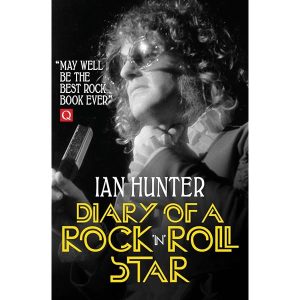 MD: Now when you had this time off during COVID, and you’re writing all these songs, did you ever…have you considered writing another book? I mean, your Diary Of A Rock Star is considered classic of its kind. And, and I see your contemporary Mr. Dylan, has just come out with this thing, (holding up Bob Dylan’s new book, The Philosophy Of Modern Song) this modern song thing. Have you got a book in you somewhere?
MD: Now when you had this time off during COVID, and you’re writing all these songs, did you ever…have you considered writing another book? I mean, your Diary Of A Rock Star is considered classic of its kind. And, and I see your contemporary Mr. Dylan, has just come out with this thing, (holding up Bob Dylan’s new book, The Philosophy Of Modern Song) this modern song thing. Have you got a book in you somewhere?
IH: No, I thought, well, a book is composed of a lot of lyrics. I just did that off the bat. I’d just got married, you know, and it was a lot of time on my hands. And we were touring and that’s why they got done. Yeah.
MD: But it seems to have held up over the years. I mean it keeps coming back.
IH: I just re-signed it, yeah, I just signed another three years on it.
MD: Now, I noticed in Horse’s Mouth you mentioned that I think Little Richard was one of your three heroes. Now, I can guess maybe who the other two are, but I’d rather you tell me.
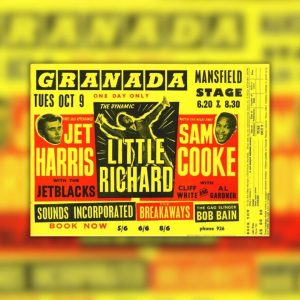 IH: Oh, there’s more than two. Jerry Lee…Whole Lotta Shakin’…Chuck Berry The King… and then there was people like The Platters you know. They talk about punk. I mean, to me, Gene Vincent was a punk. There was a lot of great people back…I saw Buddy Holly, I saw Sam Cooke and Little Richard at Granada, a town outside Northampton.
IH: Oh, there’s more than two. Jerry Lee…Whole Lotta Shakin’…Chuck Berry The King… and then there was people like The Platters you know. They talk about punk. I mean, to me, Gene Vincent was a punk. There was a lot of great people back…I saw Buddy Holly, I saw Sam Cooke and Little Richard at Granada, a town outside Northampton.
MD: Yeah, that’s mindblowing.
IH: Well, in those days, they would…Sounds Incorporated...they couldn’t afford to bring their own bands, you know, so Sounds Incorporated were backing them. And they did a great job. Cliff White was backing…was the guitar player with Sam Cooke. And he just kept on turning around to the band, you know… “Down, down, go down”. And Sam Cooke was alright. I always thought he was sort of a soft singer, but he’s not live. I mean, he brought it. I mean, honestly, nobody knew who he was.
MD: And seeing all those guys, that must have done something to you, too. Did it make you realize that this is what you wanted to do that you could do this as well?
IH: No, I was just a raging fan. The rest of it’s just the luck, you know, and hanging in hanging in. Turning from a fan to like, I was a bass player, and then I played with Billy Fury and Freddie Fingers Lee. You know, semi pro, and then slowly you start going to Germany. And that shows you what you can do seven nights a week. Now you’re thinking maybe I should do this for a living because I was a factory guy, you know? I had 40 jobs. I didn’t like the 40 jobs they were in between all this. So therefore it seemed natural to you know, to have a go, you know? And so I just kept on hanging in. Eventually, it only takes a phone call, you know, and your life is changed.
MD: I was in England in ’72 when they had the big London Rock and Roll Show. I don’t know if you remember that. And it was also the time that that Bowie was big and All The Young Dudes had come out…its interesting to me that that kind of 50s revival happened at the same time that all the other stuff did. Were you aware of that?
IH: I was it in a band that was doing… I mean Freddie Fingers Lee was if there’s, you know, Billy Fury…yeah but you know, fact is, you name it anything under the sun, and then the jukeboxes every night, you know, in the pub.
MD: Yeah, jukeboxes are great, I used to have one in my house.
IH: But when I joined Mott, what happened was they had two writers, they had Pete, Pete Watts, the bass player and then they had Mick Ralphs. And the two of them were the writers. And then Pete, because he was a good looking guy, just overloaded with models. And said, you do it, not knowing that publishing is where the money is. But he just said, I’m not going to bother, you do it. So Mick and I started writing, and that’s where that started, you know?
MD: Now, I know you were a few years older than most of the other members of the band, did that… it seems to me looking back…that you kind of dodged a lot of the problems of drugs and excess that a lot of the other rockers had gone through. Can I suggest that maybe that’s because you were older and a little wiser?
IH: I had a look, you know…Manhattan, The Kitchens you know…but to me, two hours up two hours down, you know, that’s not ideal. And also I have a brain that says, ‘go on try, and I’ll help you, I will follow’. I have that kind of a brain. So fortunately, I never got involved in that at all.
MD: I know Alejandro Escovedo toured with the Rant Band a couple of years ago. And he actually came up here to my studio and played I Wish I Was Your Mother. So what did you think…is it an honor to have somebody like that take your band out and do your songs for you?
IH: He said to me…he came to my house once… you know, how do you write? So I took him downstairs and I showed him how I wrote and he just didn’t understand a word that I was talking about. So it was a bit of a waste of time, but he’s great. I don’t know, he does a lot of covers from other people. He’s a genuine…he loves it, you know? You can sit through his set…I mean I have done…I can’t sit through sets, but I sat through with him.
MD: But what did it feel like for you to have somebody…your band and somebody else out there playing and singing your songs in front of your fans?
IH: It didn’t bother me. I mean, once they’re written, they’re written. I’m more into what I’m gonna write next. I don’t really care about what happened because it happened. Good, bad or indifferent. That’s it.
MD: Have you heard the new Stones album?
IH: I heard a bit of it, that gospel song is great. And I thought that video were there are all those billboards in LA…a great video, great video. I haven’t listened…I don’t even have a stereo I don’t think…I don’t, and all I do is write you know.
MD: Are you writing now? Because I think I saw somewhere where there you kind of alluded to a Part Three.
IH: Well, I’m alluding, I’m not alluding. My mind will stop immediately if I say there’s a Part Three. I’m having a nice little run at the moment. But it could stop anytime, you know?
MD: So what else do you do with your time? Are you into baseball, since you’re living in the States now, or are you still following the football overseas?
IH: No, it’s just local stuff, like anybody else. I was a baseball freak for about 10 years. Yeah. Well, you know, CBS or Columbia seats at Yankee Stadium. Yeah, right next to the box where Steinbrenner would be. And boy, Lou Pinella, running out of the opposite dugout and screaming at Steinbrenner! Nobody could see but we could see it because we were next door to the glass box. That’s when it was in. Yeah.
MD: Yeah. Lou Pinella was great.
IH: You know, we were up there, we go out now and again for dinner, something like that. I do a bit of a writing. We’re our age, what can you do you know, you can’t jump about like loonies.
MD: It’s true…you can try, but you’d probably break something. And you’re on Sun Records now. That’s got to be pretty cool for a Jerry Lee Lewis fan like yourself.
IH: Not only Jerry Lee, I mean, Howlin’ Wolf. There’s tons of them on that label. I mean, it’s obviously it’s not the same as it was. But still, you see that yellow label you know, it’s gives you the chills.
MD: It doesn’t Indeed.
IH: I’ve been in there, a couple of times, in the studio, it’s magic.
MD: I’ve got this thing here, this Sun Record (holding up a Jerry Lee Lewis EP on Sun) and yeah, just can’t go wrong there. They still sound great, too.
IH: That was a magic label to me, that’s where it all started, you know.
MD: Were you a fan of Jerry Lee’s Country stuff that he did kind of in the late 60s, early 70s?
IH: Yeah. Funny thing is later, the guy I played with bass with in England was was his absolute equivalent. It was unfortunate, in a way, because Fred (Freddie Fingers Lee) just was naturally that way. And he had the same thing with Country music as Jerry Lee. I got offered to meet him a couple of times, but I didn’t really want to, you know.. He had a bit of a rap and I didn’t want to ruin the you know, the vision I had of him. I remember he did The Ritz in New York. And his band got off stage and mingled in the audience in between the two sets. They didn’t go backstage. I thought, maybe he’s not in a great mood tonight, you know.
MD: Yeah, sometimes it can be a danger meeting your heroes.
IH: Yeah, well, yeah.
MD: Did you meet anyone that really kind of connected with you and you thought, “Man, this can’t get any better than this”?
IH: Probably Bob (Dylan).
MD: Yeah. How did that go down?
IH: Fine. I met him, you know, two or three times.
MD: What era of Bob-ness did you meet him first?
IH: Well, first time I met him, I was down The Other End Paul Colby’s place, in the West Village. What happened was, me and Ronson went in there one night and Colby’s place was empty. But then Dylan walked in with Bobby Neuwirth and played the whole of Desire. We’re just sitting there like, gobsmacked, you know? That developed into The Rolling Thunder Review, that particular night. So I met him that night, and I met him a 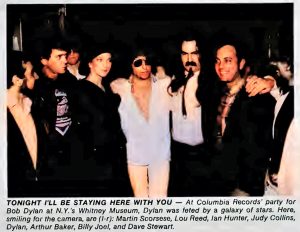
MD: Well that’s good to hear. Because as somebody who’s never met him and is a fan., he’s very enigmatic. He’d be one of the guys that I’d be afraid to meet.
IH: Oh, yeah, it was actually my wife went up to him…he was on his own. The bar at this awards show…and she said, “Do you mind if my husband has a chat”? He’s been fine, yeah, I went over and had little chat. I have a monster picture. Its about 60 by 60, yeah.
MD: Yeah. Have you seen that documentary of the making of We Are The World (The Greatest Night In Pop) with Bob Dylan kind of lost in the middle of that?
IH: You know, I don’t really take much notice of anything these days in the music world, I just do what I do. Bob, you know, obviously has tremendous influence, you know, you try and lyrically get anywhere near him you know, and…vocally early on, I used him because I didn’t have a natural voice, you know, so I used it as a stepping stone to try and find my own voice and got slagged off roundly. But, yeah, meeting him would be a biggie, yeah,
MD: I have a daughter who’s in her 30s now, but I played I Wish I Were Your Mother, she still thought it was a Dylan song because I used to sing it around the house in a Dylan-y voice and she’s like, is that really Ian Hunter? I would take that as a compliment.
IH: I like phrase singing because you know, if you’re not a proper singer, you tend to phrase things I like Sonny Bono, you know, I Got You Babe. Sonny Bono too, I kind of got a bit off him because it was like we were non singers. But somehow find a way to get across.
MD: Is that why you recorded Laugh At Me?
IH: Yeah, I liked him. You know, a lot of people are like, well…I thought he was great. Number one, he worked for Phil Spector you know and that guy knew what he was doing musically.
MD: He kind of came off as a as a joke you know as as a foil, especially on the TV show but yeah…
IH: I really like what he’s doing, his phrasing was similar to Dylan again you know, I really liked..I liked what he did.
MD: In those early Mott days you guys did some interesting covers you know, a Sonny Bono tune, a Melanie tune, was there a lot of discussion among the band about where you would go and what you were doing?
IH: Well, Lay Down was my idea. Most of them work or not. Most were Guy Steven’s ideas. I just love Lay Down, I love the song. Now and again you hear a song and it’s, alright, we got to do it and he’s no just because I want to do it…The Hereford Mafia. Well I got them to do that one yeah, but Guy, early on, would would choose them, you know?
MD: He’s a character that, of course, there’s been a lot of print made about him and stories…is the perception, the public perception pretty right on at this point of Guy Stevens and the kind of guy he was and what he was to work with?
IH: Not even close.
MD: Not even close! In a brief couple of words, what did we get wrong?
IH: Well, for me, I mean, he was huge. But, you know, he had problems. He really did. He was inside a couple of times. He had problems. And from when he was a kid, you know, but mad as a March hare and crazy, absolutely crazy. He started off as a DJ in the Scene Club in London. And you know, Jagger used to go in there and (Eric) Burdon, people like that, you know, they were picking up imports, because Guy was important. And then, you know, Chris Blackwell got ahold of him for Island Records, and he became an a&r guy, without any records, and that’s how we got on to Island.
MD: And how did you get on to Columbia? Who signed you to CBS?
IH: DeFries. Well yeah, you’re talking now Bowie. Cause out of the blue, Dave a fan, offers us Suffragette City. We don’t want to do that. We’re in a mess with Island Records. Offers us Dudes and its just like shit, I can sing this and this is a monster, you could just tell. He sat on the floor and he played it and it was like…they cannot deny us. They have to put that on the radio. If we do it. I just thought I could sing this too. And so what happened was Tony DeFries, who was David’s manager, got us off Island and got us on CBS. Then DeFries managed us for a while. And by then we were okay. We were in business. We had a few more hits in England. We were doing our thing.
MD: The line in All The Young Dudes at the end when you’re kind of rapping and you go, ‘Hey you with the glasses’, was that written by Bowie or was that come up with by you?
IH: No, that was my first rap. Yeah, we’d been at The Rainbow a couple of nights before. And we’re sitting there and Dave is like, “It’s not the hit, One Of The Boys is the hit”. We’re thinking, he’s out of his mind, you know. And he’s been going round and round and round at the end. So in desperation, I just went in and just said what I’d said at The Rainbow, you know, a couple of nights earlier. I guess it was the first rap. And then Mick Ralphs did that tremendous intro. You know…
MD: It is a beautiful thing, yes.
IH: Well, you know, we did our bit on that, yeah.
MD: I was at a Bad Company gig sometime in the 80s. I was interviewing Simon Kirke and at the time, Mick Ralphs kind of walked up behind and was toying with the guitar and just started playing that riff, the intro to All The Young Dudes out of the blue, and I almost lost my mind.
IH: And that was his. I mean, that was…Mick is, you know, another one like Ronson, simple. Not a show-off about it. Understated.
MD: I think, as a Mott fan, all of us are like, how did it not work with Ronson being in the band, but I guess it’s a personality thing that just didn’t gel with the rest of them. Is that right?
IH: It was fine by me, you know? Like I say, The Hereford Mafia really. I was surprised, I really was, because to me, it was obvious.
MD: On paper makes all the sense in the world.
IH: And they say that we paired off. We didn’t pair off at all, you know. We didn’t pair off. I mean, yes, he was on a separate deal. It was a whole different thing, you know, when he came out of the gate, it was a pain in the ass in a way because, come out of the gig and there was a limo for us. And then there would be a limo for him, from DeFries. So he was kind of kept separate. And I understand why people…Buff…didn’t like that. But to me, musically, it was great. And so why knock it, you know, just get on with it.
MD: So the stuff with the limos aside, when you were in the studio with Ronson and the band, what was that vibe like?
IH: That was great. We only did one track with him, Saturday Gigs. And what had happened was they knew I was leaving, and so Buff apparently wrote this horrible song. I can’t remember this. But the story goes, he wrote this horrible song. And they got me in there. And I panicked, because it was a horrible song, and I wrote Saturday Gigs there and then. Mick’s playing guitar and it sounds beautiful. It didn’t make the top 30 I think it went about 34 or something like that. I just figured the game is over because that track was great. And it should have been a hit. And it wasn’t.
MD: Yeah, it should have been. Oh, well. Now do you have something coming out, a Jesse Malin song that you recorded is being released soon?
IH: Yeah. Jesse got in a spot of trouble with his health and yeah, we’ve done something for Jess.
MD: And when will that see the light of day, you know?
IH: I don’t know, I haven’t spoken to him in a while. It was done through James, James Mastro.
MD: Okay.
IH: A member of my band, you knew…
MD: Yeah. Jesse played here many years ago but…great artist, I love him. Hope he does get better.
IH: He’s out with Alejandro now, Jesse.
MD: Oh Good! Well, that’s good to hear that’s for sure.
IH: He’s got his own album…he opens for Alejandro, and then he gets up and plays with Alejandro.
MD: So for an old road dog like yourself a guy who has been rocking and rolling and doing shows for all these years, was there some kind of stuff that you had to go through in your head when you realized that you couldn’t gig like you used to because of the tinnitus and all that?
IH: Well, you sort of dream of gigging. Yeah, yeah. Shit happens, what can I tell you, you know. It happens to everybody. I don’t want to go out unless I can give a good show. You know, its as simple as that. And I’m right in the middle of that at the moment. Its been one thing after the other,as it happens when you’re in your 80s. Yeah, but if I can get myself sorted, you know, yeah, it won’t be a full band, it will be q&a, you know, cos I’m done jumping about.
MD: It’s just great that folks in their…I mean, Mick Jagger is 80 and Keith just turned 80 And they’re doing their thing and it’s just like, you know…
IH: We wont go.
MD: They were talking about The Stones ending…could they do it past 30?
IH: Yeah, well, I didn’t start till I was 29. 50 years later here we go.
MD: Here we go. Fantastic. Well, I thank you for everything and especially the new album but I’ve been a huge fan ever since I think ’72 when I first heard you, so it’s been a real pleasure and I hope to see you again on the stage sometime. I’ll travel the world. I don’t think you’ll be making it down under anytime soon. But you know there is a an Australian Down Under Ian Hunter Appreciation Society. Are you aware of it?
IH: Yeah, I’m very grateful to them.
MD: They are forever hopeful
IH: Its a bit of a slog.
MD: Very good. All right. Well, thank you very much. And like I said I wish you nothing but the best and everything you’ve done for me and all of us rockers. Thank you very much. Bye bye.
Click here for more Ian Hunter
- Adam Hattaway & The HauntersJuly 25, 2024Wine Cellar (13th Floor Concert Review) - July 26, 2024
- New Music Friday: 13th Floor New Album Picks: July 26, 2024 - July 26, 2024
- Holly Arrowsmith – Blue Dreams(Leather Jacket Records) - July 25, 2024

